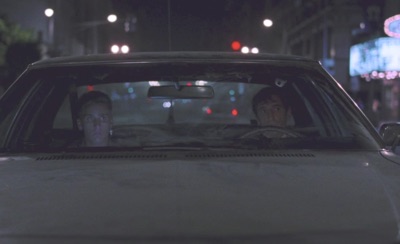
First up for my favorite and a movie that influenced me from 1984…the cult fave and cable staple Repo Man! It was produced by Mike Nesmith with unknown Emilio Estevez in the lead alongside Harry Dean Stanton and Tracy Walter. Beyond some cameos from punkish bands Fishbone and the Circle Jerks, I’ve never heard of the remaining cast members. It had a great soundtrack too. Opening theme song from Iggy Pop before he’d team up with Bowie again or have his only mainstream hit singing with Kate Pierson of the B-52s. The rest was a good sampler of the LA scene: Circle Jerks, Black Flag, Suicidal Tendencies and Los Cruzados. I’d say it’s a solid Eighties LA Punk starter kit before you graduate to X and Bad Religion.
I readily admit this movie never hit my radar when it hit movie theaters during its (likely) brief 1984 run in the Spring. By then we have moved to Indiacrapolis, the Midwest’s center of dull. This so-called city is so fucking boring, it makes Milwaukee Bohemian. The place is only suburbs, there is no actual city nor culture beyond David Letterman and he fled to LA way back in the Seventies. So in short, Repo Man never appeared or it had a one-week run. I wouldn’t have known. I wasn’t a fan of the city’s newspaper plus there were no ads on TV or its Rock stations leading the charge to go backwards.
Thankfully my parents did pay for cable TV and Showtime when we moved to Beulah, ND. They did it to keep their sanity instead of continuing to be cheap jerks after two years, plus there was no “The MTV” as their clueless generation was fond of saying. Repo Man hit the channel around November 1985. Initial reactions were, “What the kind of movie is this?” was frequently heard, even amongst us high schoolers. After a couple viewings, I “got it.” Same for my friends Mike, Darren, Jon and Paul. We could be heard quoting it now and then at school, especially the song “Pablo Picasso.” Fun fact, it was originally written and performed by Jonathan Rickman, not Burning Sensations.
What’s it about though? The story is the satirical adventure of Otto, an unemployed young man living in Reagan’s Utopia! Desperate for money and hurt over his girlfriend dumping him for his best friend, he is accidentally recruited into repossessing cars. While on the job he takes in the wisdom of the various employees about boosting cars, time machines, John Wayne’s sexuality and never carry a gun, “only an asshole gets killed over a car.”
Meanwhile, everybody in LA is hunting down a ’64 Malibu since the Federal Government will $20,000 for its recovery. Why? To the repo men, who cares! That’s serious money! To some weirdo Scientology-like organization, it contains proof they need about aliens. To the government, it’s best kept a secret since whatever is in the trunk is dangerous; when the movie opens, a motorcycle cop gets vaporized after pulling over the driver.
Director Alex Cox did a fantastic job making a movie regardless of cult status! You can feel as well as see the seething hatred of the Reagan years. All the poverty in the background and the prolific use of generic-labelled products everywhere. A quick tutorial for Mills and younger people. Due to the horrible inflation of the Seventies, by the Eighties, there was a rise in food and other household goods in containers, colored white with black/blue print on them stating what it was, minus a brand, a graphic or a photo. For example, you see everybody often sitting around the office drinking cans of “beer” or Otto scraping what’s left from a can of “food.” These products disappeared by the end of the Eighties. Why? I don’t know. They were funny and I don’t recall having any shame buying them. My guess? The general public didn’t want to be reminded how much the Republicans had pushed (and still have) us toward Orwell’s nightmare.
Forty years later, Repo Man remains very funny, the quotable lines remain a secret code with aging Gen Xers despite a few things Mills and Zoomers will cancel us over and I hope like hell, no asshole in Hollywood or Nextflix tries to remake it. The movie coincides with the alienation many young people felt as “morning in America” was really a nightmare of probably nuclear war at best, or the slow burn toward the Soylent Green future we have.
